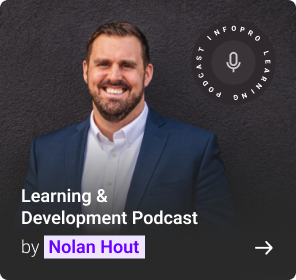Have you ever envisioned a corporate learning environment where employees’ training journey is as unique as their fingerprint, finely tuned to their specific needs and skill sets? The value of personalized eLearning is becoming increasingly apparent as the corporate eLearning landscape changes significantly. In this era of tailored professional development, the question arises: How can organizations harness the power of individualized learning experiences to unlock the full potential of their workforce?
According to Technavio, the size of the corporate eLearning market is set to surge by an impressive $38.09 billion between 2020 and 2024, underscoring the magnitude of this transformative shift.
As we embark on this exploration, picture AI guiding each employee’s learning journey, understanding their patterns, and shaping their training and development. Here, the importance of Artificial Intelligence (AI) in personalized eLearning in corporations aligns seamlessly with the theme. In this blog, we delve into the future of corporate eLearning, where individualization and AI propel learning leaders toward innovative, employee-focused learning.
AI in eLearning: A Comprehensive Overview
AI is a dynamic force in eLearning due to its potential to replicate human intelligence. Its scope within eLearning extends beyond traditional methods, offering innovative solutions to longstanding training and development challenges. AI acts as a catalyst in addressing challenges related to personalization in eLearning by leveraging vast amounts of data. Through the application of artificial intelligence, granular analysis of individual learning behaviors is facilitated, enabling the creation of personalized learning pathways that resonate with the unique needs of each learner.
AI Techniques Shaping Personalized eLearning
- Machine Learning (ML): Clustering and Collaborative Filtering
Machine Learning techniques, like clustering algorithms and collaborative filtering, revolutionize personalization by grouping learners based on similarities in profiles, interests, and interactions. This facilitates the dissemination of content that closely corresponds to individual learning preferences. - Deep Learning: Adaptive Learning Paths and Complex Relationships
Deep learning, powered by neural networks, goes further in personalization. It maps intricate relationships between learner data points, facilitating the creation of adaptive learning paths that dynamically respond to individual progress and challenges. - Natural Language Processing (NLP): Understanding Comprehension Levels
Leveraging Natural Language Processing capabilities, trainers can analyze learner-generated text data, including assignments, discussions, and feedback, to gain deeper insights into their understanding and progress. This deep understanding enables the tailoring of subsequent materials to match individual comprehension levels. - Computer Vision: Evaluating Engagement in Real Time
eLearning platforms can leverage computer vision to analyze facial expressions and body language in real-time video assessments. This gauges emotional engagement and allows immediate adjustments to maintain optimal learning conditions. - Conversational AI: Providing Personalized Assistance
Conversational AI, in the form of chatbots and virtual assistants, engages learners in real-time. These virtual guides offer personalized assistance by deploying natural language processing and dialog management, making the learning experience more interactive and responsive.
Benefits of AI-Powered Personalization
For Learners:
- Reduced Cognitive Load and Tailored Content Presentation: AI ensures that content is presented in a format optimized for individual comprehension levels, reducing cognitive load and enhancing learning efficiency.
- Seamless Guidance through Optimal Learning Paths: Personalized learning paths, dynamically shaped by AI, guide learners seamlessly through training content based on their strengths and weaknesses.
- Instant Feedback on Knowledge Gaps and Personalized Recommendations: AI-driven assessment and feedback systems provide instant insights into knowledge gaps, offering tailored recommendations for improvement.
For Organizations:
- Higher Learner Satisfaction, Engagement, and Retention: Implementing personalized eLearning experiences demonstrably enhances learner satisfaction and engagement, culminating in a positive correlation with retention rates.
- Improved Knowledge Acquisition and Skills Development: AI-powered personalization enhances knowledge acquisition and skills development, aligning learning objectives with individual needs.
- Streamlined Instructional Design and Actionable Insights from Predictive Analytics: The integration of AI streamlines the instructional design process and provides actionable insights through predictive analytics, enabling organizations to refine their learning strategies proactively.
Overcoming Challenges in Personalized eLearning
Addressing Privacy and Data Security Concerns
Ensuring the privacy and security of learner data is paramount in AI-driven personalized eLearning. Anonymizing and encrypting personal information, obtaining explicit consent, and adhering to industry regulations are key measures to address these concerns.
Strategies for Overcoming Resistance to Change
Resistance to change is a prevalent obstacle to adopting AI-driven personalized eLearning. Employing transparent communication, extensive training initiatives, and showcasing successful case studies can help organizations overcome resistance and foster an innovation-friendly environment.
5 Steps: Implementing AI Personalization Successfully
Step 1: Define Clear Personalization Goals
Define measurable personalization goals that bridge business needs and learner aspirations, steering successful AI implementation.
Step 2: Collect High-Quality Training Data
The foundation of successful AI-personalized eLearning lies in collecting extensive and high-quality training data from varied sources, which facilitates the creation of accurate learner profiles.
Step 3: Engineer Relevant Features for Accurate Learner Profiles
Engineer relevant features that capture the nuances of individual learning behaviors to develop accurate learner profiles.
Step 4: Develop and Integrate Robust AI Models
Create and integrate robust AI models involving ongoing training and refinement to adapt to evolving learner needs and eLearning trends.
Step 5: Continuously Evaluate, Refine, and Retrain
Subject AI solutions to continuous evaluation and refinement, periodically retraining with new data to maintain their effectiveness over time.
Conclusion
AI emerges as the master key, unlocking the potential for personalized eLearning at scale. Its capacity to analyze vast amounts of data and tailor learning experiences positions it as a transformative force in digital training.
Acknowledging the potential of AI, it is essential to use this technology responsibly. Adhering to privacy measures, obtaining user consent, and ensuring fairness in AI models are imperative for ethical and efficient learning outcomes. The transformative potential of AI-powered personalized eLearning extends beyond individual learning experiences, shaping the future of digital training worldwide. As organizations embrace this synergy of technology and pedagogy, the landscape of corporate eLearning is poised for innovation, efficiency, and unparalleled growth.
Would you like to take further steps in using AI in your personalized eLearning? Contact our team of AI experts. Email us at info@infoprolearning.com or share your thoughts in the comments section below.





